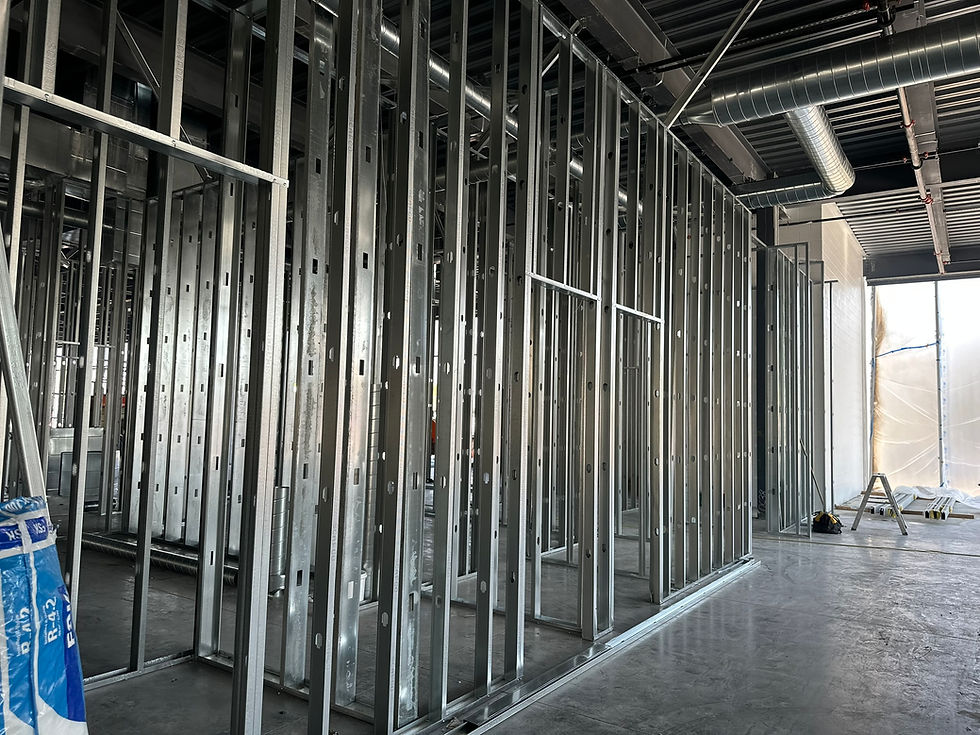Estimating for Specialized Services: Drywall, Metal Stud Framing, and Acoustic Ceiling Tile
- H&D Construction

- Oct 18, 2023
- 2 min read
In the intricate dance of construction, estimating holds a pivotal role in project success. When it comes to specialized services like drywall installation, metal stud framing, and acoustic ceiling tile work, the estimation process takes on a unique set of challenges. In this blog post, we'll navigate the complexities of estimating for these specialized construction services, shedding light on the intricacies of materials, labor, and practical strategies to achieve accurate and precise estimates.
Understanding the Challenges:
1. Material Variability: Each specialized service requires specific materials with their own costs and variations. Drywall thickness, metal stud dimensions, and acoustic ceiling tile options all contribute to the variability in material costs.
2. Labor Expertise: Specialized services demand a skilled labor force with expertise in the unique techniques and nuances of drywall installation, metal stud framing, and acoustic ceiling tile work. Estimators must account for the specialized labor rates required for these crafts.
3. Project Scope and Size: Estimating for specialized services means navigating projects of varying scopes and sizes. Whether it's a small commercial renovation or a large-scale residential development, the scope impacts material quantities and labor hours.
Estimation Strategies for Precision:
1. Detailed Takeoffs: Begin with a meticulous takeoff that accounts for every material requirement, from drywall sheets and metal studs to acoustic ceiling tiles and associated hardware. Pay attention to measurements, thicknesses, and design specifics.
2. Material Unit Costs: Research and gather accurate unit costs for specialized materials. Consult suppliers, manufacturers, and industry databases to ensure up-to-date pricing information.
3. Labor Breakdown: Divide the specialized labor into specific tasks – such as drywall hanging, metal stud framing, and ceiling tile installation. Assign labor hours to each task based on project complexity and expertise required.
4. Overhead and Indirect Costs: Don't forget to include overhead costs, such as tools, equipment, transportation, and administrative expenses. These hidden costs play a crucial role in accurate estimation.
5. Site Conditions: Specialized services often involve unique site conditions that impact the installation process. Consider factors like accessibility, existing structures, and potential obstacles when estimating labor and material requirements.
6. Contingency Planning: Specialized projects are prone to unexpected changes. Allocate a contingency percentage to account for design revisions, unforeseen challenges, and scope adjustments.
7. Collaborative Input: Collaborate with skilled tradespeople, project managers, and experienced estimators to ensure that your estimates align with the practical realities of specialized construction work.
8. Incorporating Experience: Leverage historical data from similar projects to gauge material quantities and labor hours accurately. Learning from past projects helps refine your estimation process.
Precision Yields Success:
In the realm of specialized construction services, precision in estimation is paramount. The delicate balance between materials, labor, and unique project factors requires a meticulous approach. By applying thorough takeoffs, staying informed about material costs, and collaborating with industry experts, estimators can provide clients with accurate estimates that set the foundation for successful projects. In the end, precise estimates for drywall, metal stud framing, and acoustic ceiling tile work ensure that specialized projects are executed seamlessly from inception to completion.




Comments